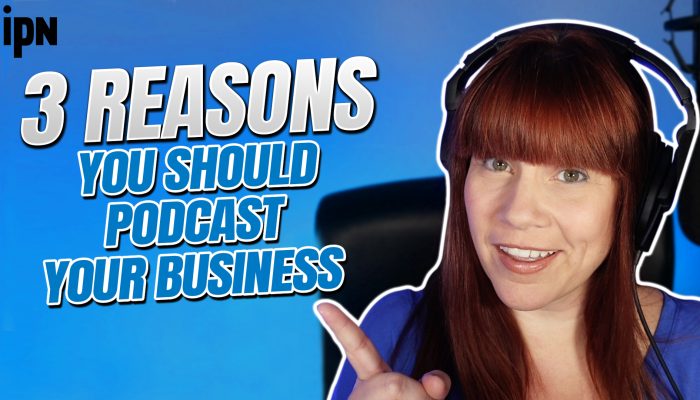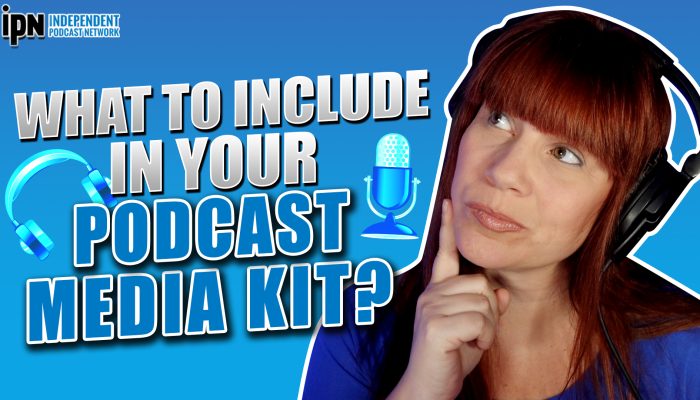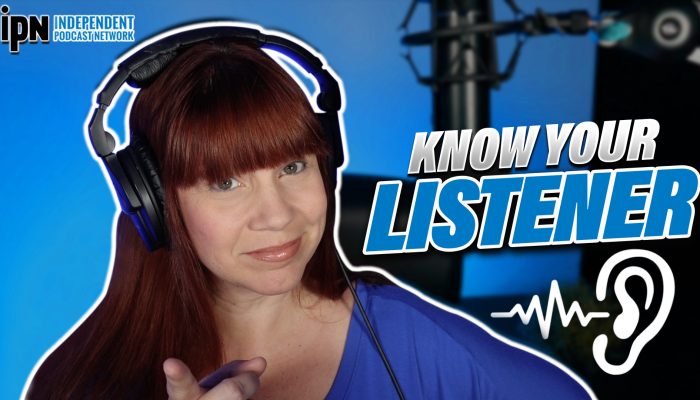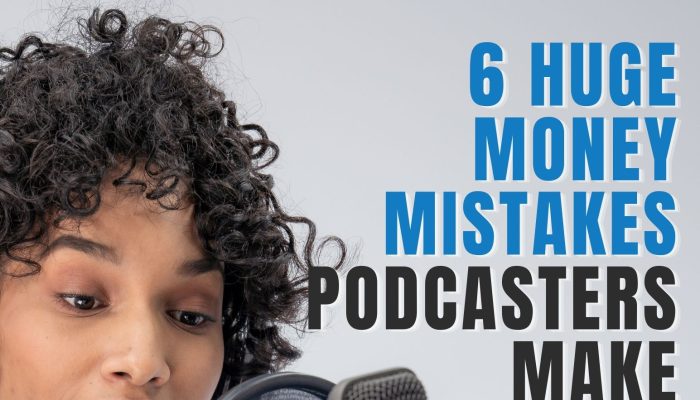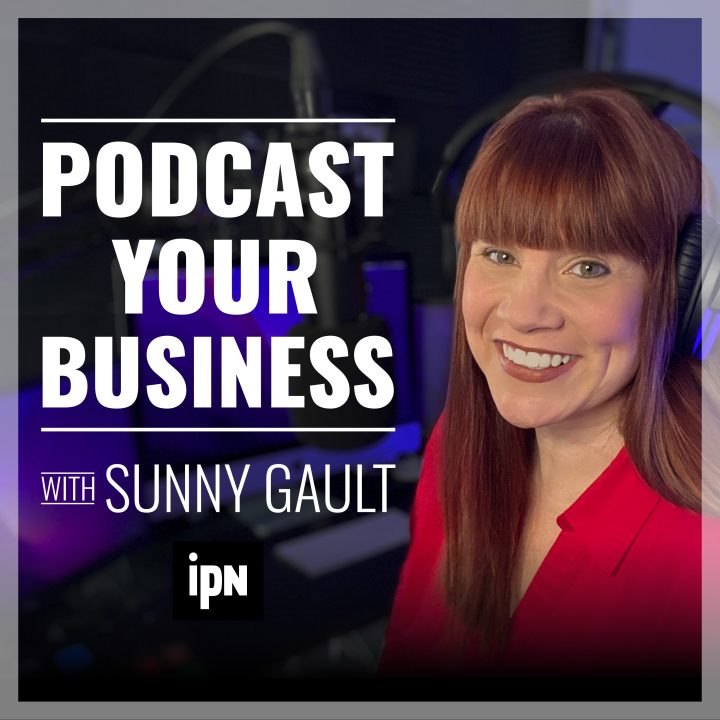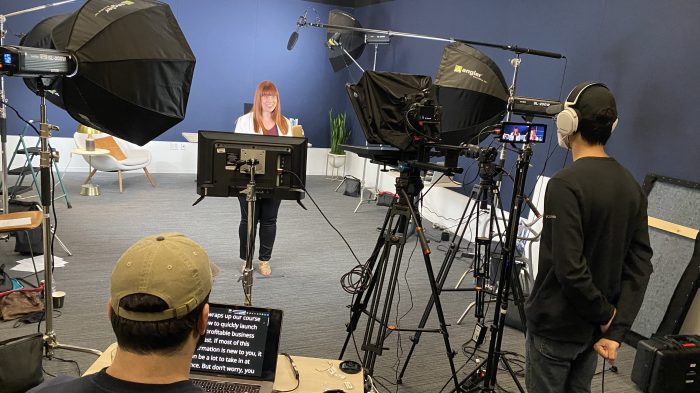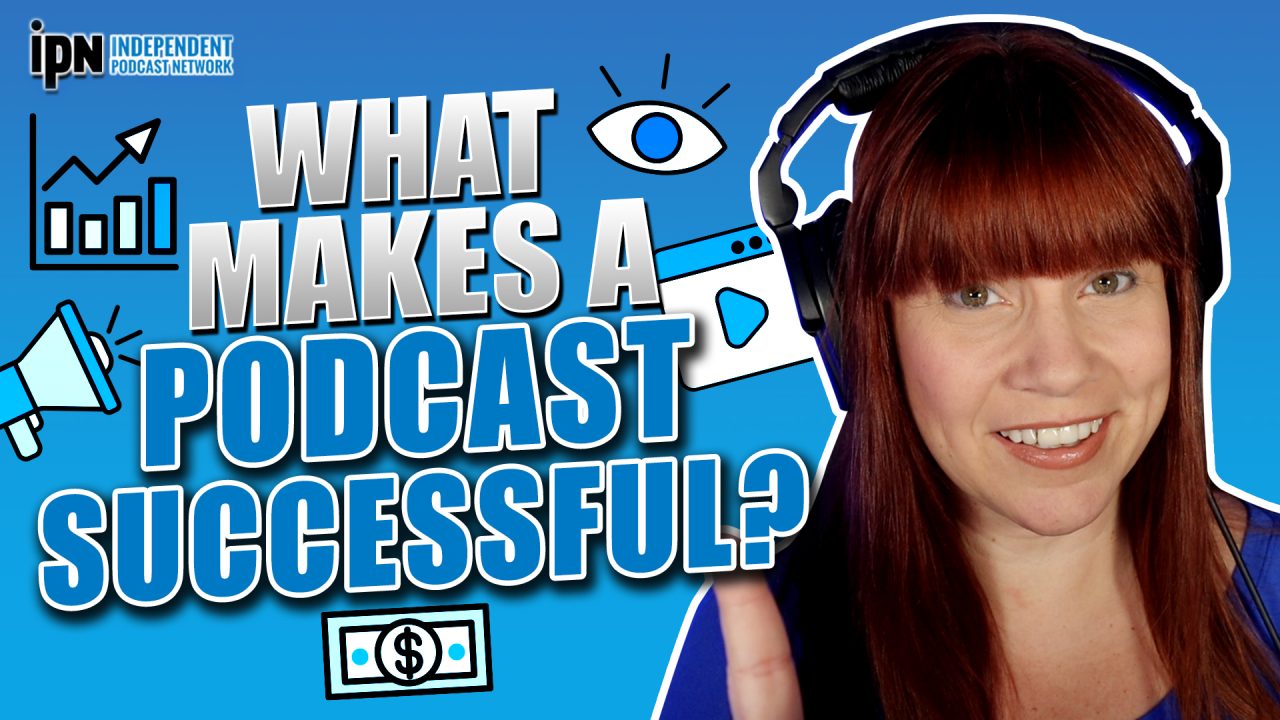
it all starts with having podcast goals
It’s a new year. It is a time when many people start new podcasts– and experienced podcasters think about what they want for their shows in the year ahead. Regardless of the decisions you make, we all want the same thing…. to have a successful podcast. But., what does that even mean? How do you know if you’ve had success with your podcast? And if you haven’t felt successful, how do you change that around in this new year?
Here’s what we’re going to talk about…
- Knowing the “why” behind your podcast
- Planning out your podcast goals
- Assessing the “success” of your podcast
- The importance of pivoting and making adjustments
here are the steps needed to start your podcast!
Grab this guide and start checking off each item as you complete it. Before you know it, your podcast will be ready to launch!

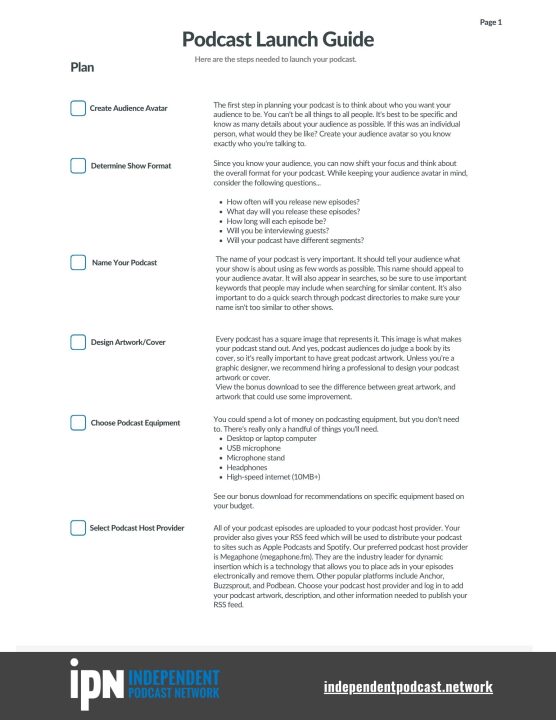
Episode Transcript
0:01
It’s a new year, a time when many people start new podcasts, and experienced podcasters. Think about what they want for their show in the year ahead. Regardless of the decisions you make, we all really want the same thing to have a successful podcast. Well, what does that even mean? How do you know if you’ve had success with your podcast? And if you haven’t felt successful? How do you change that around in this new year? Today? We’re asking the question, what makes a podcast successful? Take it away, Mr. radio man. Podcast Your Business.
0:46
Hello, everybody. And welcome to Podcast Your Business. I’m Sunny Gault. I’m a podcast coach and mentor who’s been podcasting for oh, I used to say, 17, I think we’re up onto 18 years now, you kind of lose track after a while, right. I am also the founder and CEO of a company called Independent Podcast Network. And we love to help podcasters you can check out our work at https://independentpodcast.network. And we’ve got a ton of free information for people who are brand new to podcasting, or you just want to brush up on a particular podcasting topic, we’ve got a great search bar at the top, you can just search for whatever topic you want. And these podcast episodes are part of that content. I started this podcast about a year and a half ago, maybe. And we’ve been doing it throughout 2023. And I’ve loved every minute of it. So we have today is our 65th episode, which is awesome. We have talked about a lot of different podcasting topics. So I do have an announcement for you guys. Up until this point, this podcast has been a weekly show, and I want to give you a heads up that we’re no longer releasing weekly episodes. For this show. I do plan to produce more content. Because as a podcast coach and mentor, I’m always learning, I’m always discovering new things. My clients are always coming to us with new questions. And so I know that there’s going to be a need for more episodes moving forward. But this isn’t really something I necessarily feel has to be a weekly show. I’ve gotten out all the topics that you know, are the big ones that you guys have come to me, you know with in the past. And I think it’s time just to slow down the pace a little bit. So wanted to give you a heads up for that the podcast isn’t going anywhere, this feed is always going to be here for you guys. But as far as releasing weekly content, I’m just going to do this on an as needed basis. So when these topics present themselves, I will release a new episode. So when they give you a heads up on that, but we do have a great episode for you guys today. I’m always about helping you guys create amazing podcasts, specifically for your business. And we do this by mastering the five Ps of podcasting.
3:05
So what are the five Ps of podcasting? I came up with this concept of five Ps when I was creating my first podcast course, which is available for free on our website. And it’s great for people who are just getting into podcasting. And I thought, well, what makes for a successful podcast? Going back to today’s main topic, right? And I thought, okay, there’s really five sections or five areas to focus on prep, plan, produce, promote, and profit. And so with each episode of podcast your business, we focus on one of those five P’s, Mr. radio man, which of the five peas are we talking about today? Plan? That’s right, we’re talking about planning for your podcast. Because defining success for your podcast, it’s going to look different for everyone, right? Everyone has a different idea of what success looks like. But it’s all based on the parameters or goals that you’ve set for yourself. And this usually happens in the planning process for your show. For those of you who are brand new, you know, it’s a new year, we’re going to start a new podcast. A great time to do this is at the beginning as you are planning for your show. Because it’s good to have goals, right? So you can tell if your show is successful when you go back and you re analyze those goals. But you can also do this throughout the lifetime of your podcast. So if you’ve been podcasting for a while, and you’re like, oh geez, I’ve never really created goals. Start today. Hey, there’s nothing stopping you start from this moment forward. I am a firm believer that when you set goals for yourself, it inspires you okay? You may not always reach those goals and we’re going to talk about that a little bit. But a lot of times you’ll find that you shot even higher than what you the goal that you’ve set for yourself, right? Because we’re concept is kind of like a competition just within yourself to do the best you possibly can. DO and SO big fan of goals and we’re going to talk about that as part of our conversation today. So here are some of the bullet points. And this is what you’re going to be able to take away from today’s episode, we’re going to talk about knowing the why behind your podcast. Why are you doing this? Or why are you thinking about starting a podcast? Because on those days where it’s really difficult, and trust me, doesn’t matter how good of a podcaster you are, you are going to have those days where you don’t want a podcast, it was very difficult for me to get out today’s episode, I’m like a week behind and getting out today’s episode. Because I was sick, my whole family was sick, and I lost my voice. And I was like, Oh my gosh, I really just don’t want to do a podcast episode today. And whenever I have that feeling, I have to go back to my why. Why am I doing this? We’re going to talk more about that. We’re going to talk about planning out your podcast goals. And that’s going to be really the bulk of what we’re talking about today. Because if you don’t have goals, then how are you ever going to determine if your show is successful. But then it’s also about, you know, taking a look at those goals, assessing those goals, and determining if your show is successful based on those goals. And if it’s not, that’s okay, too. Because our final bullet point is about pivoting and making adjustments. Because especially as your show just starts out, you’re kind of grasping at straws, when you come up with your goals. You’re like, Well, I kind of want this and I want that and I want this, and you don’t really know, what is the best thing for your podcast, but you got to start somewhere. And it’s completely fine to pivot, make adjustments. I’ve done that a million times, I’m going to share some of those stories with you today. And we’re gonna get started on all that right after this quick break.
6:40
So let’s talk about the why behind your podcast. Why are you either thinking about starting a podcast? Or why did you start a podcast? And is your motivation even the same anymore? On the show, I’ve talked a lot about the parenting shows that I first started podcasting with and I launched the shows back in 2012. They are still around today, we are still producing new content, not all the time. But this has been an ongoing project for me. And I have to tell you, that the why behind me starting those shows is not the same. Why is it is today? I mean, the shows have been going on for 11 years now, on the spot map that is not my strong suit. But you know, that’s a long time. When I started the shows, it was all about me learning because I had little babies and I was still having babies, right. And so I did content based on what I needed to know to get me through a pregnancy or, you know, those early stages of parenting or whatever, you know, breastfeeding, we’ve got a whole show focused on breastfeeding and breast milk. I had a million different questions. That was my why I had some other wise as well. Okay. But that was my main why in starting those podcasts, while I’m not in that phase of life anymore. So what is my why today? My why today is helping other people. Because I’ve been there, I’ve done that I’ve been in those situations, and I know how much it helped me. So for those shows, I’m not hosting those shows anymore, I have found passionate people that are in that stage of life, that want to run with those shows and are super excited because they have little babies or, you know, they’re getting pregnant, or whatever the case may be. Those are the best people to do those shows. And now I have more of an advisory role in a management role, if you will. But the shows are still ongoing. And I’m still learning and I’m still growing from the podcast and of it. So you have to know what your why is behind doing your podcast. And it can’t be because someone told you how to good podcasting voice because I’m telling you what that is not gonna get you through your first year, or maybe even your first month or whatever it is, you have to have a really good why so know your why, because you’re gonna have to keep going back to that, you know, when times get a little bit more challenging.
9:10
The other part of that and knowing your why is is kind of part of this next section as well is planning out your podcast goals. And I want to talk about that a little bit more. Because there’s a million different reasons that people do podcasts. I’ve kind of broken this up into two different camps, but you could probably break it up in many different ways. But when I look at podcasts, I usually look at people that are doing this for personal reasons. And then people that are doing this for business or professional reasons. Let’s first talk about the personal side of stuff that may not fit this audience exactly. Because again, the show’s called podcast your business, but you’ve probably seen podcasts like this that are really out there really just for personal game. You may create a podcast because it sounds fun, right? And it’s about a topic that you’re passionate About, the first thing that comes to mind are people that do podcasts based on shows that they love, or maybe a sports team that they’re really passionate about. There is nothing wrong with that. Sometimes, in fact, some of the really popular shows right now are either family or friends coming together and doing a podcast together. You know, there’s the brother show, what is that new heights. My son watches it because it’s on YouTube as well, the podcast new heights, which is with a couple of football players who are brothers, and I think the one guy is dating Taylor Swift. I don’t follow any of that stuff. But the point is, I believe that is the number one podcast right now. And what I loved about it, because I’m just watching one episode today on YouTube, is that the boys are the football players. I’m calling them boys, but they’re probably a lot younger than me. They’re in completely different locations, but they are able to reminisce about their childhood. And on one episode, they even brought their mom in to talk. And it was just a lovely thing. And they’re able to have that to build their bond. You know, sharing childhood memories. They also talk a lot about football, obviously. And that’s a really fun thing for them. They’re having fun. Is it tied to their profession? Yeah, it is. Are they really doing this for business reasons? Probably not. I think they’re just having a really good time. Right. So having a podcast that’s just fun for you. Do we all need some more fun in our life. So think about that. Usually, if people really enjoy podcasting, they end up with more than one podcast. So maybe right now you’re focused on something for your business. But maybe there’s something else you’re really passionate about just totally lights you up. Having a show that’s just for fun to give you joy is really important. So that’s one option, maybe you’re trying to overcome a personal fear, the first one that comes to mind is some sort of public speaking, maybe you want to do more public speaking, but you’re a little afraid to, you know, talk off the cuff, you know, you get a little bit nervous when there’s a microphone in front of you. So overcoming some sort of personal fear, I think is a great reason to start a podcast and to get that experience and to connect with other people.
12:10
And the third reason I thought of is just to try something new. I think this is great for podcast coaches, I do this all the time, I’m going to give you guys a couple of examples. When I’m working with podcasters, I think it’s important for me to have as much experience as possible. So when I’m giving recommendations on things to do, I like to speak from experience as much as I can, it’s not always possible. But when I can, I’d like to do that. And so I’m going to give you two different examples of shows podcasts that I have launched, that may be questionable as to whether or not it was successful. I actually deem both of these as successful, but I’m not producing content for either of them today. So some people may say, Well, you know, you didn’t end up making a lot of money with this, or whatever the case may be. So you know it, how can you say that those were successful, but I learned a lot. So let me give you these examples. The first one was a show that I launched called Morning Mom Minute, Say that five times fast. It was a daily show daily meaning five days a week. So I didn’t do it on the weekends. I did it for about two to three months. And it was supposed to be a show that you could kick your day off with specifically for parents and even more centered towards moms because again, I was already producing a lot of content for moms. And it was kind of like what do you need to know in the world today? So it drew on my news background for those of you don’t know, I went to school for journalism, I worked at TV and radio stations. And I’m still doing that today. And so I kind of brought that into my podcasting background. I made it fun, it was uplifting. You know, we talked about mom type things. And it was very topical. So it was important for me to release an episode get it out there especially me being on Pacific Time, get it out there as soon as I could for the people on the East Coast and other places in the world. And I did that for like I said like two to three months. And I learned a heck of a lot. But I also learned at the end of that time that the effort I was putting into the show I certainly was not getting back out from the show if that makes sense. So I decided to chalk it up as a learning experience because I learned a ton. And now when podcasters come to me and they’re like I want to do a daily show. Guess what I get to do I get to pull on my previous experience and doing a daily show. Not to discourage them but to let them know what to expect. So for me Morning Mom Minute was absolutely a success because it helps me in my day to day work. So it was successful for me. The second show I want to tell you about is still around today you can still find it. I actually pulled all the morning mom content because it was topical. So when a topical show, you know stops it you know is someone gonna go back and listen to the news from three years ago? Probably not. Okay. But if your topic and the things you’re talking about are evergreen, meaning they can stay up there for a long time and still be relevant, you can keep the podcast up there, especially if you’re using a platform where you don’t have to pay, you know, to keep your RSS feed going. And that was a case for another show, I launched called Millennial Santa. And the idea behind this was, it was the show focused on kids. And it was to connect kids with Santa Claus, but not just talk about the common things that, you know, common questions kids may have for sanit. We call that millennial Santa, because we wanted to tap into the questions kids have today. More tech questions and things like that, that really made the show more relevant. And so I partnered with Santa Claus, who shall remain nameless. We had so much fun with the show. It is still around, you can still search for it. I played Sunday, the elf, right. And we worked at KELF, which is a fictional radio station. And Santa and I would do this show and we would bring on kids and it was a lot of fun. And yeah, I mean, it served its purpose. I had a blast. My kids at the time were really young when I was doing this show. So they thought mom was like the most amazing mom in the world for having a show with Santa Claus. So I got brownie points for that. 2020 was the last year that we did the show. And we decided that year. So we did like three seasons, I think back to back seasons. And then in 2020, we had the pandemic. And I was heartbroken from a mom’s perspective, because I thought, oh my gosh, no one’s gonna go see Santa Claus. So we actually expanded the show to have a YouTube component as well, where kids could, you know, have like little, you know, their time was Santa. And we were broadcast live, we did a whole live show called Christmasful, which is still on YouTube. And the reason I’m telling you all of this is that, you know, what were we able to do with the show? Well, for me, it was a success, because I had so much fun with my kids, my kids were on the show, you know, they would help me prep for the show and do videos for the show, we just had so much fun. I learned a lot about doing seasonal podcasts, which is a completely different thing than a show that can come out anytime, because who really wants to talk to Santa in July. Right? And I had to think about, you know, strategies for that. And can you actually make that work from a financial perspective. So that’s another example of a show that, again, it’s evergreen, it’s still out there. In fact, in December, November, and December, our biggest month, we haven’t released content and like, whatever, three years, and we still get, you know, 5000- 8000 downloads a month in November and December. So it is still serving a purpose. And that’s to, you know, connect kids and you know, just to celebrate the season, and then all of the podcasting information I learned. So I just wanted to provide those as examples to you. You know, when you’re starting a show, you may have, you know, ideas of what you want to do. And, you know, it may change over time. And that is totally fine. But that was a personal thing. Both of those were personal things that I wanted to do.
18:39
All right, now let’s talk about your business. Because a lot of you may be creating shows specifically for your business. Or maybe you already have a show out there, and it’s focused on your business. So I just want to run through some of these, and you probably already considered some of these, but some of these bullet points for how you, you know, your your show, or your podcast can help your business. So the first thing might be brand awareness, right? You want to get the name out there, your logo, whatever it is about who you are, and what you do, that is a great reason to start a podcast. Also to expand your audience, the targets, maybe you have something new that you’re teaching, if you’re a teacher or something like that, and you kind of need to branch out, well having a podcast that specifically about that can really help you reach a new target, demographic or target audience. Maybe you just want to be a thought leader. And you want your ideas out there and you want to connect with other people and have, you know, really interesting conversations. That’s a great reason to have a podcast. Also direct sales. I’m always encouraging you guys, listen, if your podcast is connected to your business, somehow your business should benefit now maybe that’s through direct sales, maybe you are selling products and services directly on your show. So that would be an example of direct sales, also lead generation. So maybe you just want to talk about different things and say, Hey, are you you know, working through this? Do you Need some support. And this, I do offer these kinds of services reach out to me. So that’s more like a lead generation tool. And another thing that we’re seeing more and more of which is kind of fascinating. And yes, this is usually geared towards bigger companies. But we are seeing internal podcasts being created within companies. And that can be done for many different reasons, strengthening the culture within your company, right? Having a show, maybe you interview different people in the company, you know, you talk about company values and things like that, that could be a great reason. And again, usually for larger companies, but you can have your own internal podcast for that. You can also use podcasts as training guides, that could be very specific of you know, different things, different positions within your company, I kind of you podcast, your business as a training podcast as well. It’s just not internal, just for people that work on IPN. It’s for everybody, right? It’s training pot podcast for anyone that wants to start a podcast, especially those of you who are doing this for your business. So those could be some different goals. And you may not have all of them, there may be just a few that you’re going through. But it just wanted to give you guys some ideas. When you’re thinking about goals for your podcast specifically for your business, consider some of those.
21:17
And I would encourage you as well to create short and long term goals. Now, if you’re doing this for your business, you may be thinking about quarters, because most businesses are run on quarters. And that’s typically what I do, I think about things in three month increments, and then you’ve got four of those every year equals 12 months, right? So what are your goals for the first three months? What are your goals for the second and the third and the fourth. So that’s how I would group it. And then within those different quarters, think about goals. Like it needs to be reasonable. So to say something like I’m gonna have as many, you know, listeners as Joe Rogan, like, that’s just kind of silly, right. And who even wants that amount of people, that’s, that’s way too much pressure. But think about what’s reasonable. And then what I typically do is I shoot at least one step higher than that. Because you don’t want to just stay where you’re at, you want to keep growing. And like I said, at the start of this episode, usually what I find is that if I shoot higher, I achieve higher. So don’t just play it safe, think what’s reasonable, which is different than playing it safe, think what’s reasonable, and then shoot at least one step higher, create those different goals. You know, like I said, I do it according to each quarter, maybe you just want to have, you know, a six month goal. And then you know, end of the year goals or something like that. But create those now, this is a great time to do that. And then once you have those goals set up, now we can really get into the nuts and bolts of defining success for your podcast. Because the whole reason we create goals is we want to achieve those goals. But especially in the beginning, like I said, you might be kind of shooting in the dark, because you’re creating these goals, but you don’t really know where the parameters are and what’s really reasonable, you’re going to learn that pretty quickly. So I think it’s a great idea on a quarterly basis, review your goals with yourself, you know, your assistant, your partner, your team, if you have a larger podcast, or if this is connected to your business, and everyone is kind of involved. It’s a good idea to review those goals. And you know, really be specific. So, you know, when creating those goals, you’re not just gonna say, oh, I want you know, to get more direct sales, you’re gonna put a number to that, or somehow define what you mean by that. So yeah, that’s a goal, but make it more specific, right? And then when you’re reviewing it and trying to determine, have we met our goals? Have we been successful based on the goals that we provided for ourselves? Then you can kind of gauge it, right? But you gotta have some parameters there. And it’s just about determining how well did you do. And I think this is a really good thing to please celebrate your wins. celebrate your success stories, because maybe you didn’t get 10 direct sales in your first quarter as a result from your podcast. Maybe that didn’t happen. But it led to something else. Someone else saw your podcast heard your podcast, and you were invited to speak. You were the main speaker at XYZ conference. You know, maybe it paid you money, maybe you just made some incredible connections with it. So we can’t be super stringent. But it may be that your podcast, you know, your goal was this but it led to other things as well. All of those are successes, celebrate your successes, and I even like to reward myself maybe you can think about that in advance like oh, we’re all gonna go out to dinner or whatever. When you know this happens. That’s really important and all Also, as you’re going through your goals, it’s also important to allow yourself the freedom to look at it. And this is my next bullet point to pivot and make adjustments. Because it may be that you were way off on something, because you’re shooting in the dark, because that’s kind of what you do in the beginning. And it’s okay to say, you know, what, we shot way up here, you know, this was our goal. And, you know, this is what we accomplish. So let’s just bring it down a little bit, we have found, you know, we didn’t think about this, we didn’t think about this, we didn’t think about this, now that we have that information, we can, you know, really define our goals a little bit more, make them a little bit more reasonable, but still shooting once at least one step above, right? Don’t be afraid to pivot and make adjustments, there’s nothing wrong with that, that does not mean that you failed, okay? If something isn’t working, you pivot and you try something else, or you make some sort of change.
25:58
Now, an example of this right now, we’re kind of dealing with this right now, in the podcast industry, if you don’t already know, Apple made a really big change, they call it an update. I think that’s kind of questionable if it’s really an update, but it had a profound impact on when episodes were automatically downloaded, if you happen to subscribe, or follow that podcast on whatever app. So what they found is a lot of content was being downloaded. But people weren’t actually listening or watching the episodes. So the podcast was getting the download numbers. But it wasn’t very accurate. So when those kinds of things happen, you definitely need to adjust because we want our numbers to be as legitimate as possible. The fault that I have with Apple right now is there was no warning that this was going to happen. And as someone who works with a lot of podcasters, and works on a lot of campaigns with advertisers, we really deserved a heads up. Because one of the things that has happened is a lot of podcasts, numbers and downloads have dropped 30 to 40%. Now, we’re talking about across the board. So large shows small shows. And this can be very scary, especially for people who really rely on that income, if you are working with advertisers like we do. And we promised the advertisers a certain amount of downloads based on what the history has been with a certain show. Well, if Apple comes in and totally changes something, then that impacts our numbers in a really big way. And it impacts advertising dollars and the podcasters in a big way. And we had one of our shows come to us on our network and say, Oh, my goodness, this was a really big change. We’re thinking about completely rebranding our show. Now, this is one of those opportunities to look at what you’re doing in the space, and how can things be improved. And what we found is we took a look at their show, we took a look at how they were titling their episodes, we took a look at their artwork, we took a look at their author tag, the things that I’ve talked about in the past that, you know, just slightly adjusting some things could bring you a lot of organic followers, because you’re going to be showing up more on search engines. And I did a whole episode on Podcast Your Business about this, so you can search for that. But this is a good example of a show, looking at the situation and being honest and saying, Wow, we are not meeting our goals. Regardless of how we got to this place. We’re not meeting our goals, what are some of the things that we can do now to adjust and we were able to provide them with some really good information, I hope they take it to heart and make some of those changes, because it will help improve the amount of people that are finding their show. So that’s an example of pivoting and making some changes based on not meeting your goals.
28:54
Another example is this show and my decision today I told you guys at the top of the show, I have decided to not produce weekly episodes anymore for podcast your business. And it’s has nothing to do with the amount of downloads. It’s because I accomplished what I wanted to accomplish with this show, which was to get the information out there to share my experiences, to share documents and things that I’ve created in the past to help podcasters to share information about all the courses, the free information that’s available on our website. That was the point of podcast your business. And I really have talked about all the things I really want to talk about. We have an amazing library of content to help podcasters and future podcasters. And the other thing is I’m starting to work on some other projects and those projects are a little bit higher on the priority list. So I’ve accomplished what I wanted to do, you know, and therefore you need to pivot you need to change things, but it’s all about having those goals, knowing what’s important to you, and then being willing to make changes when you You’ve accomplished what you wanted to do. You know, if you are learning if you are growing, if you are having fun, please have fun with your podcast. And if you are accomplishing some of the goals you have outlined for yourself. That’s when you know your podcast is truly successful.
30:18
Thanks for joining us on this episode of Podcast Your Business, it has been my honor to coach you guys. And to help you guys with your podcast. Again, we’re not going to be doing regular weekly episodes. But please stay subscribed because when new stuff happens and the industry changes, and I feel like there’s information that needs to get out there, I promise, more episodes will be coming in the future. I do have a free handout for you guys. It is called the free podcast launch guide. So for those of you who are at the start of creating your podcast and launching your shows, like I said, the beginning of the year is a really popular time to do that. And this is a free guide that shows you exactly the steps that you need to take and it’s available for you on our website. You don’t even have to give me your email address. Just go ahead, click the link, it’s in the description below. And it’s all yours. Of course, we have a lot of free resources available at our website, which is https://independentpodcast.network, we come up with weekly blog posts. All of our podcast episodes are there. I have videos there, handouts, and entire courses, including one that’s all about dynamic advertising. So if you’re thinking about going down that path, please check out our website. And I usually say “until next week, remember”…. but it’s not going to be next week. So until we talk again… remember, podcasts are awesome!

